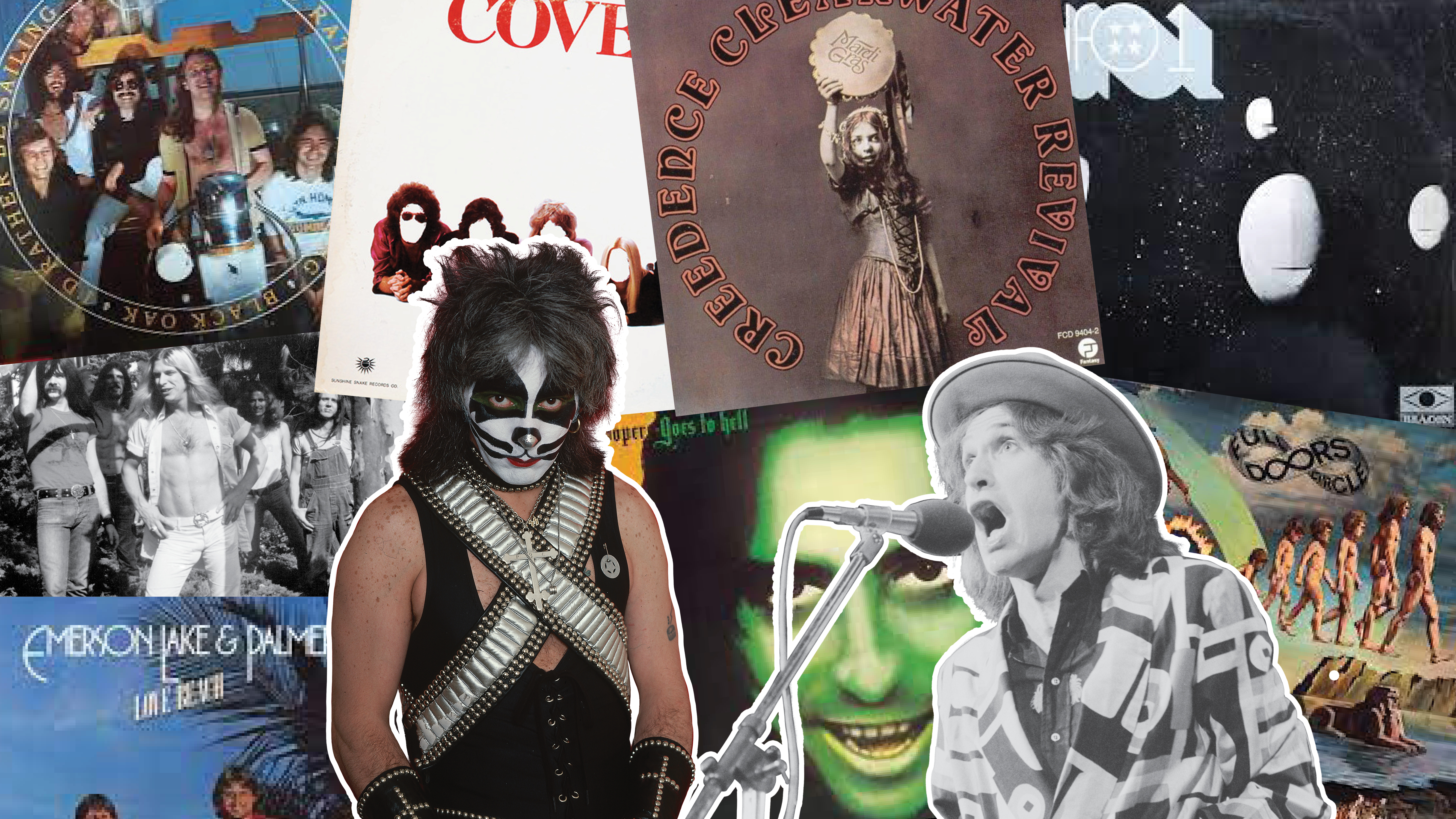The 10 worst albums by 10 brilliant 70s bands
The 1970s may have been a golden decade for rock, but even the best bands out there made a few turkeys

When trying to determine the weakest records by the best bands in the 1970s, a few provisos are necessary. To prevent unfair domination by drummers’ vanity projects, we’re not including any solo albums by Ringo Starr or Keith Moon, while the jury’s still out on Metal Machine Music by Lou Reed (11 of them think it’s shit, but the twelfth juror’s mind is blown).
Realistically there are groovy and charming moments on every one of these long players, and it was a tricky list to assemble; there just weren’t that many abject turkeys to be plucked from classic rock’s finest decade, despite the fact that all the best bands were tripping balls 24/7 and were forced by their labels to release an album every eight months.
So crack open your Watneys Party Seven and strap in for a bumpy ride back to ‘the decade that taste forgot’.

UFO – UFO 1 (Beacon, 1970)
“You’ve got to start somewhere” they say, although most 70s rock royalty managed a creditable debut displaying at least a hint of a promising signature sound. Not so for UFO; years before welcoming German guitar prodigy Michael Schenker and becoming one of the best-loved British bands of the late 70s (and a primary influence on the New Wave of British Heavy Metal), they were tentatively knocking out this load of aimless hippy garage fuzz, crudely recorded and sloppily performed. Even the Bo Diddley, Eddie Cochran and Harry Belafonte covers were rendered forgettable by the maladroit delivery and miles-away guitar sound.
Coven – Coven (MGM, 1971)
Coven’s 1969 debut Witchcraft: Destroys Minds And Reaps Souls was rock’s first avowedly occult LP – and a favourite of Charles Manson. However, after the resultant storm of controversy, no record company would touch such explicitly devotional Satanic psychedelia; hence a compromised Coven settling for tepid MOR boogie, piano-and-strings schmaltz and a Jailhouse Rock cover on this limp, Lucifer-free second LP. "It was a record label decision,” singer Jinx Dawson told us in 2013. “The suits did not want a blonde female screaming chants to demons in the early 70s… they simply wanted to sell safer, watered-down versions, not controversial realities.”
The Doors – Full Circle (Elektra, 1972)
No doubt Jim Morrison could have done worthy things with some of the material on 1971’s Other Voices, the remaining Doors’ first post-Morrison LP, released just three months after the Lizard King’s Paris bathtub death (and six months after the release of cast-iron classic LA Woman). Full Circle was their second and final attempt to launch a frontman-free Doors, and it sounds far more cluttered and disjointed, the trio pulling in different directions and coasting down each, with a dozen session musicians and backing singers adding a variety of bells and whistles that can’t distract from the record’s clap-happy mundanity.
Creedence Clearwater Revival – Mardi Gras (Fantasy, 1972)
“The worst album I have ever heard from a major rock band,” judged Jon Landau in his 1976 Rolling Stone review of Creedence Clearwater Revival’s career-ending seventh album, and although that quote says much about the artisanal standards of quality in the 70s rock mainstream – any LP with Sweet Hitch-Hiker on it can’t be that bad – Mardi Gras is still a flaccidly insufficient valediction for one of America’s finest groups. After a run of six terrific albums from 1968-70, you can forgive John Fogerty for his inspiration running dry, but not for letting bassist Stu Cook write and sing three tunes.
Sign up below to get the latest from Classic Rock, plus exclusive special offers, direct to your inbox!
Humble Pie – Street Rats (A&M, 1975)
Kept on the road by a gruelling contract since 1969, by 1975 this knackered supergroup were running on empty. To counter this, frontman Steve Marriott was blowing an ounce of cocaine every two days, convincing himself to record a solo album and a separate project with bassist Greg Ridley on top of label A&M’s urgent priority, the eighth Humble Pie LP. Wired from coke abuse, the restless musicians were amassing piles of material, but their lack of focus and discipline prompted A&M to ‘confiscate’ the patchy recordings, finishing and releasing them without the band’s consent. The Pie collapsed shortly afterwards.
The Kinks – The Kinks Present A Soap Opera (RCA, 1975)
“It’s a period when I shouldn’t have been allowed to make records. I should have been locked up!” Ray Davies later joked of his 70s theatrical phase, when every Kinks album had to be built around a convoluted narrative concept. Soap Opera – a banal, condescending yarn based on Ray’s TV screenplay about a rock megastar swapping lives with a suburbanite Mr Average called Norman – was less convoluted than the two preceding Preservation LPs (albeit with fewer stand-out tunes), but that didn’t soften Dave Davies’ acerbic assessment of the record as "an exercise in Ray's disappearing up his own arse".
Alice Cooper – Goes To Hell (Warner Bros, 1976)
Coop’s first ‘solo album’, Welcome To My Nightmare, was a pivotal, ambitious leap forward for the shock rock icon, but this sequel dropped the ball so hard, he had to go to hell to retrieve it. The vigorous, villainous raunch of the Alice Cooper band is gone, in favour of family-friendly vaudevillian showtunes, weak funk and creaky MOR, with Bob Ezrin’s kitchen-sink production, piano, strings and choirs zeroing in on the most egregious excesses of the mid-70s mainstream. One potential explanatory thrust of the album’s sketchy concept is that Alice can only triumph over the Devil by playing crap tunes.
- RELATED READING: The most valuable EPs of the 70s
Emerson, Lake & Palmer – Love Beach (Atlantic, 1978)
'We can make love on Love Beach/ Out of reach of the lion's claws tonight,' sings Greg Lake with a straight face on this decadent 70s low point, recognisable in most charity shops as the one with ELP done up like the Bee Gees on the cover. If they’d claimed it was a sardonic piss-take we might have believed them, but no, this was a genuine attempt to streamline the trio’s eccentric progressive complexity into commercial, girlfriend-baiting pop hits. Keith Emerson was never convinced, and in a 2006 ELP biography declared the career-ending album "an embarrassment against everything I've worked for".
Black Oak – I'd Rather Be Sailing (Capricorn, 1978)
The title brazenly broadcasts an all-round lack of interest and commitment ("I'd rather be doing anything other than this album,” quipped frontman Jim ‘Dandy’ Mangrum in 1994), as big a warning sign as the removal of the word ‘Arkansas’ from the band’s name. Time was, Black Oak Arkansas were the most flamboyant, intense Southern rockers of the 70s, Jim Dandy a key influence on the showboating antics of Dave Lee Roth. In the year of Van Halen’s explosive debut, BOA (now, appropriately, BO) were bidding a meek farewell, this MOR snooze-fest providing not so much a bang as a whimper.
KISS – Peter Criss (Casablanca, 1978)
Released simultaneously in 1978, the four KISS solo albums were a notoriously mixed bag. Ace’s was ace, Paul’s decent and Gene’s pretty bad, but the poor old Catman was neutered, defanged and cast adrift in a well-used litter tray, extending his role as the Ringo of KISS to producing cheerfully unlistenable solo pap. Relying on songs he’d written for his pre-KISS band Lips in 1971, Peter Criss was mostly dated and twee smooth-jazz/pop-soul schmaltz embellished with tepid horns and heavy-handed keyboards. Sadly, Peter’s substance abuse accelerated after the LP’s failure, and by 1980 he was out of KISS altogether. Coincidence?
Chris has been writing about heavy metal since 2000, specialising in true/cult/epic/power/trad/NWOBHM and doom metal at now-defunct extreme music magazine Terrorizer. Since joining the Metal Hammer famileh in 2010 he developed a parallel career in kids' TV, winning a Writer's Guild of Great Britain Award for BBC1 series Little Howard's Big Question as well as writing episodes of Danger Mouse, Horrible Histories, Dennis & Gnasher Unleashed and The Furchester Hotel. His hobbies include drumming (slowly), exploring ancient woodland and watching ancient sitcoms.

